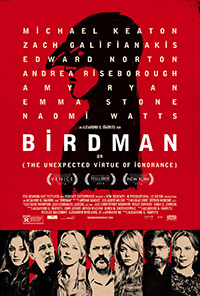DiscoBiscuit
Meat Tornado
- Joined
- Apr 13, 2009
- Messages
- 14,794
- Enneagram
- 8w9
British House of Cards
| Birdman or (The Unexpected Virtue of Ignorance) Without giving too much away, it's the story of a has-been actor who was famous 20+ years ago for playing a superhero in a series of movies (played by Michael Keaton) who decides he wants to "go legit" to kickstart his career: he's going to produce, direct and star in a Broadway play. What follows is an interesting (if not a little too obvious) dissection of modern movie-making framed by a lead character rife with self-doubt and regret. One thing you'll notice very quickly is that it's edited to appear as though it's one long take, which I was a little apprehensive about at first. Long takes often come across as the director's self-aggrandizing, as though they're saying to the audience "Look! See!? Look at how great a director I am!", without serving much purpose to the narrative. This one, despite being as though it lasts the entire movie, serves the narrative very well. It made me feel like I was watching a play unfold on a stage, which tied right in with the plot of the movie itself. It was as though everything outside of frame was backstage, the camera moving from one set piece to the next to give the crew time to redress the stage for the next scene and time for the actors to change costumes. I know that's not how it really played out but it looked like it; it felt like it. (By the way the subtitle is totally unnecessary...) |

|
| Nightcrawler What is a "nightcrawler"? The dictionary says "an earthworm". Particularly one that only comes out at night and is favoured as fishing bait. At the start of the film you might think of Jake Gyllenhaal's lead character, Louis Bloom, as a worm of a man. In the first scene—night time, of course—he's at a train yard, clipping a chain link fence. He's tresspassing; is he trying to break into the train yard? No, no, he's stealing the chain link and selling it for scrap value; strictly cash only of course. Louis asks the construction site supervisor to whom he sells chain link, manhole covers and copper pipe for a job, even an unpaid "internship", but he's rebuffed: "I'm not gonna hire a fucking thief." He makes enough money as a petty thief to get by but he wants a career. You see, Louis is a reader: he reads about things—everything—on the internet. He takes online business courses when he's not stealing bikes from Venice Beach. His appetite for learning is voracious. Out of coincidence our lead character drives his dour little 30-year-old Toyota Tercel hatchback past a car crash. He stops, and soon after a van with a film crew shows up and turns their cameras on in a frenzy. These aren't reporters from a TV station though, they're "stringers": freelance "video journalists" (more like ambulance-chasing paparazzi) who trawl the nightly goings-on on their police scanners in search of the sort of carnage that'll sell to a TV station. Louis is inspired. He has found his calling. He hires an assistant whom he pays $30 a night and quickly becomes one of the best-paid stringers in Los Angeles. Over the course of the film he goes to deeper and deeper depths of depravity to get the footage he needs for his next big paycheque. The film is a window into a bizarre nocturnal world where people drive around LA in the wee hours looking for footage of "urban crime meeting the suburbs", a critique of the sensationalist newscasting we've become accustomed to (Louis has studied the amount of time local newscasts spend on reports of violent crime vs. everything else), and it's all through the eyes of a sociopath who has memorized every lame mantra he has ever read in business textbooks. |

|
